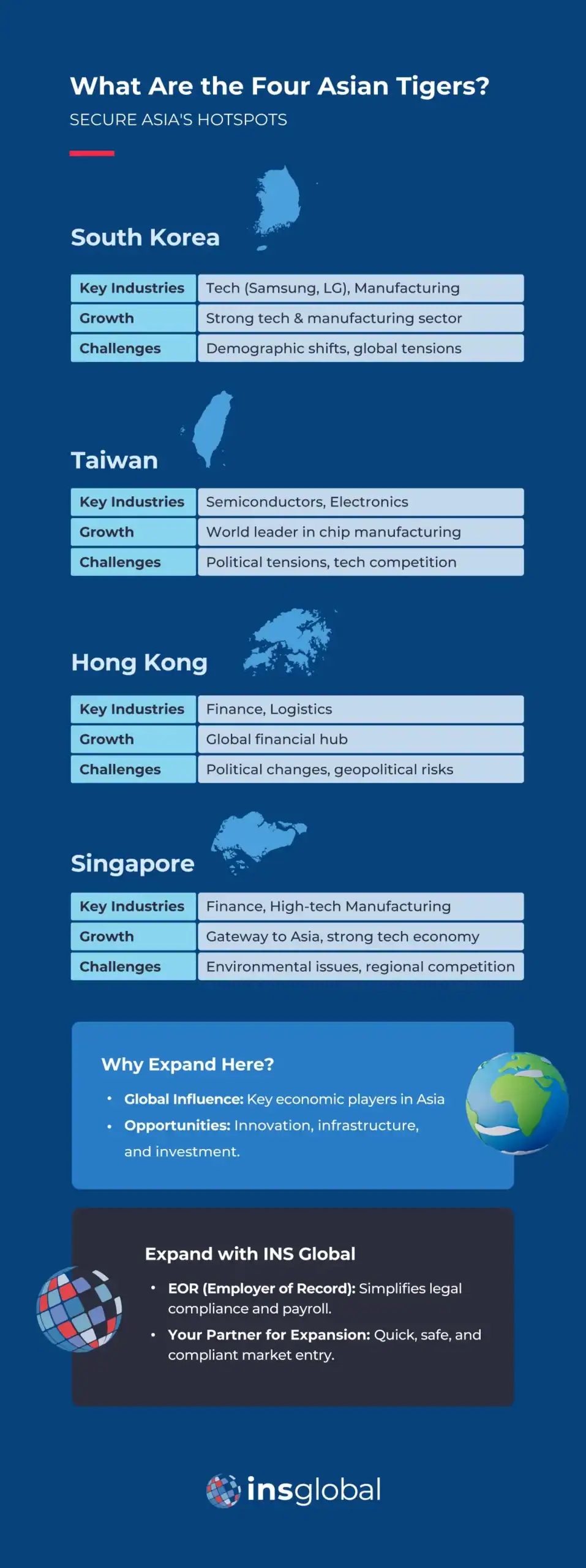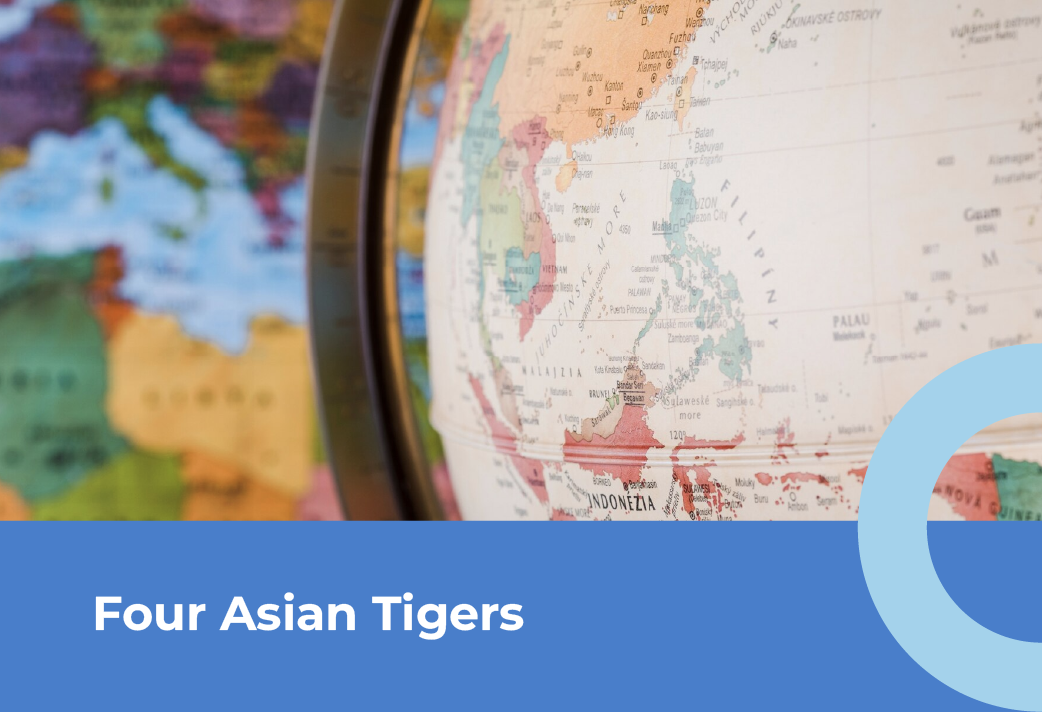The Four Asian Tigers are Hong Kong, Singapore, South Korea, and Taiwan. Also known as the Asian Dragons, these territories have achieved remarkable economic growth and development in the modern era, propelling themselves into the ranks of the world’s wealthiest and most influential economies.
Companies all over the world continue to flock to these markets to enjoy their rapidly expanding economies, but legal compliance concerns and local needs are hurdles that can cause costly delays or problems for the unwary.
In this article, we explore the past, present, and future of the Four Asian Tigers, focusing on their economic capabilities as emerging markets for global companies.

Tired of scrolling? Download a PDF version for easier offline reading and sharing with coworkers
Understanding the Four Asian Tigers
Each of the Four Asian Tigers possesses unique characteristics and strengths that have contributed to their rapid economic advancement.
South Korea
In the 1960s, South Korea faced economic challenges comparable to those of the poorest nations in Asia and Africa. However, through government intervention, directed credit drives, and targeted import restrictions, South Korea saw substantial growth in a relatively short space of time.
Thanks to the above, South Korea enjoyed an average of 4.9% annual growth between 1988 and 2022. Today, it boasts a robust manufacturing sector and a strong tech sector, including some of the world’s biggest electronics companies, including Samsung, SK, and LG.
Taiwan
Taiwan has risen as a major tech hub, exerting a significant influence on the global economy.
With a focus on innovation and export-oriented policies, Taiwan has become a leader in industries such as electronics and semiconductor manufacturing, with more than half of the world’s chips being produced on the island.
Hong Kong
As a special administrative region of China, Hong Kong still enjoys significant economic freedom. Thanks to the growth of Guangzhou and Shenzhen on the mainland, Hong Kong is becoming more closely associated with the larger Pearl River Delta Metropolitan Region.
Renowned as a global financial hub, Hong Kong’s transparent regulatory environment and well-established infrastructure have attracted businesses and investors from around the world. Should Hong Kong continue to grow closer to other cities in the region, it will be able to benefit further from a potential total population of 86 million people.
Singapore
Singapore stands out for its efficient governance, low corruption, and strategic geographic location. With a strong emphasis on trade and investment, Singapore has cultivated a dynamic economy driven by innovation and entrepreneurs.
Since its independence from Malaysia in 1965, Singapore has cemented its position as the “gateway to Asia“. Thanks to international connections, the country maintained high growth and successfully transitioned to a high-tech economy thanks to stable governance and investment in transport infrastructure. Singapore has been seen as the most fruitful of the Four Asian Tigers, having successfully converted rapid growth into solid long-term success.

The History of the Four Asian Tigers
The economic success of the Four Asian Tigers can be traced back to their rapid industry growth and export-oriented growth strategies.
Throughout the latter half of the 20th century, these territories implemented policies aimed at promoting economic development, resulting in sustained high levels of growth and prosperity.
Economists quickly recognized the potential of these territories despite the challenges of limited land or natural resources. All four economies are reliant on foreign investment, high industrialization, and business-friendly legal systems, factors that combine to provide opportunities for growth that far outstrip their size.
As these economies grew, the Four Asian Tigers were increasingly integrated into larger global markets, offering a way to stabilize growth yet also putting them increasingly at risk, such as during the Asian Financial Crises of 1997-1998.
Recent Developments and Challenges
Despite their impressive achievements, the Four Asian Tigers face various challenges in the modern era. These include demographic shifts, technological disruptions, and global tensions.
Additionally, the COVID-19 pandemic posed unprecedented challenges to their economies, highlighting the need for resilience adaptive ideas.
Now, having largely transitioned into knowledge or service economies, they face new challenges in terms of regional changes or questions about climate-related resource security.
Looking to the Future: The Economic Strengths and Influence of the Four Asian Tigers on the Global Economy
As global economic power continues to shift towards Asia, the Four Asian Tigers are still poised to play an increasingly influential role on the world stage.
With their advanced infrastructure, skilled workforce, and innovative capabilities, these territories are well-positioned to drive future growth and innovation in key industries such as technology, finance, and high-tech manufacturing.
How to Plan Your Expansion to Asia Today with INS Global
In an increasingly global world, businesses seeking growth and expansion opportunities must look to the dynamic markets of the Four Asian Tigers. Hong Kong, Singapore, South Korea, and Taiwan offer unparalleled opportunities for investment and business development.
However, safe and effective expansion requires a thorough understanding of local business needs. To make the most of an expansion into the Four Asian Tigers, you’ll need to be able to easily navigate local business regulations as well as cultural practices around recruitment and labor.
That’s why a local partner providing global Employer of Record (EOR) services can be the perfect way to expand quickly, safely, and effectively. An EOR offers easy mastery of local employment laws and effortless integration of local employees into multi-country payroll systems. An EOR provider like INS Global, with offices across the Four Asian Tigers and nearly 20 years of experience, can even help you with services like hiring and contract management.
So, contact INS Global’s team of dedicated global expansion experts today to plan your expansion to Asia and unlock the full potential of these dynamic markets in 2024 and beyond.
FAQ
Q: What are the Four Asian Tigers?
The Four Asian Tigers, also known as the Asian Dragons, comprise Hong Kong, Singapore, South Korea, and Taiwan. These territories have achieved remarkable economic growth and development over the past few decades, propelling themselves into the ranks of the world’s wealthiest and most influential economies.
Q: What are the characteristics of the Four Asian Tigers?
Each of the Four Asian Tigers possesses unique characteristics and strengths that have contributed to their rapid economic advancement. South Korea, Taiwan, Hong Kong, and Singapore are known for their export-oriented economies, high levels of education, and strong emphasis on innovation and technology.
Q: How did the Four Asian Tigers achieve their economic success?
The economic success of the Four Asian Tigers can be attributed to their strategic policies, including export-oriented growth strategies, investments in education and infrastructure, and government support for key industries. Additionally, their ability to adapt to changing global economic conditions and leverage their respective strengths has played a significant role in their growth.
Q: What challenges do the Four Asian Tigers face?
Despite their impressive achievements, the Four Asian Tigers face various challenges, including demographic shifts, technological disruptions, and geopolitical issues. Additionally, factors such as aging populations, income inequality, and environmental issues are becoming increasingly important considerations for their long-term economic development.
Q: How Can I Expand Easily to South Korea, Taiwan, Hong Kong, or Singapore?
Using the services of a global Employer of Record (EOR) can help you expand quickly, cost-effectively, and safely. EORs such as INS Global provide a simplified way to start operating abroad without the need to establish a new local entity by acting as the official employer to your workers in a foreign market. This saves time and money while also assuring total compliance with local HR and payroll requirements.

SHARE